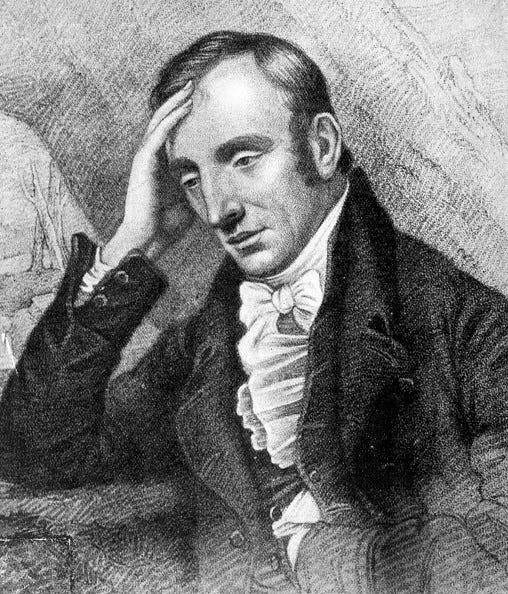The Writer's Almanac from Sunday, April 7, 2013
"It will be Summer—eventually" (#342) by Emily Dickinson, from The Complete Poems of Emily Dickinson. © Back Bay Books, 1960.
ORIGINAL TEXT AND AUDIO - 2013
Today is the birthday of William Wordsworth, born in Cockermouth, England (1770). For two hundred years tourists have gone to England's Lake District to see Wordsworth's daffodils and other places he wrote about in his poems. He and his friend Samuel Taylor Coleridge collaborated on the collection Lyrical Ballads (1798), that opened with Coleridge's "The Rime of the Ancient Mariner" and closed with Wordsworth's "Tintern Abbey." The book helped spark the Romantic Movement in English poetry.
Wordsworth believed that poetry "takes its origin from emotion recollected in tranquility" and that poets should use the language of the common man. Coleridge wasn't interested in tranquility; he said that "poetry reveals itself in the balance or reconciliation of opposite or discordant qualities" and Wordsworth grew tired of Coleridge's addictions, his mysticism, and his volatile behavior, and wanted a more stable life. In 1802, he married a childhood friend, Mary Hutchinson, and settled down to raise five children and took a government job.
The poet J.K. Stephen wrote about him:
Wordsworth, at certain times
Forth from the heart of thy melodious rhymes
The form and pressure of high thoughts will burst:
At other times — good Lord! I'd rather be
Quite unacquainted with the ABC
Than write such hopeless rubbish as thy worst.
The first city-to-city television broadcast took place on this date in 1927. Secretary of Commerce Herbert Hoover was in a studio in Washington, D.C., and an audience sat in an auditorium in New York City. The broadcast began with a close-up of Hoover's forehead, because he was sitting too close to the camera. He backed up and said, "All we can say today is that there has been created a marvelous agency for whatever use the future may find with the full realization that every great and fundamental discovery of the past has been followed by use far beyond the vision of its creator." He was followed by a comedian performing jokes in blackface.
It's the birthday of Donald Barthelme, born in Philadelphia (1931) and raised in Houston, Texas. He published short fiction in The New Yorker and wrote four novels, including Snow White (1967), a contemporary take on the fairy tale. His short stories were very short, what some people call "flash fiction," with odd plots: "Daumier," for example, is the story of a Texas ranch with a herd of beautiful girls instead of cattle.
He wrote, "The aim of literature ... is the creation of a strange object covered with fur which breaks your heart."
It's the birthday of Billie Holiday, born Eleanora Fagan in Baltimore (1915) to teenage parents. She was performing in clubs as a teenager, recorded with Benny Goodman, worked with Artie Shaw and Lester Young. She struggled with drug addiction, but her apartment in the Bronx was always open to unemployed musicians, and she left a plate on the table that held money for food and subway fares. In her autobiography she wrote, "Singing songs like the 'The Man I Love' or 'Porgy' is no more work than sitting down and eating Chinese roast duck, and I love roast duck."
She died at age 44.
Be well, do good work, and keep in touch.®
The Lake Wobegon Virus softcover
Now in paperback—bestselling author and humorist Garrison Keillor returns to one of America's most beloved mythical towns, beset by a contagion of alarming candor.






Sacajawea lived to a ripe old age. Where did you ever hear that she died in her 20s?
Thank you for including Billie Holiday. Next time add something about her huge impact on jazz.